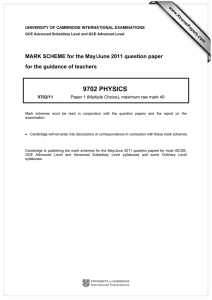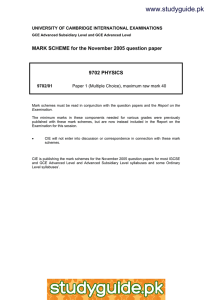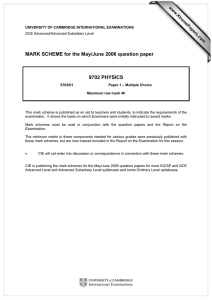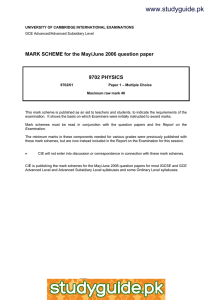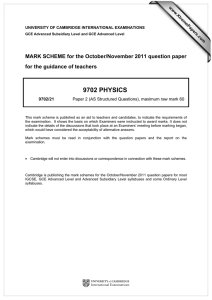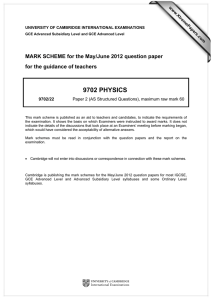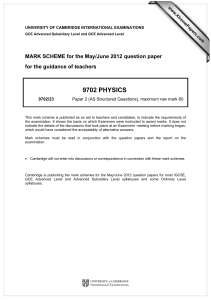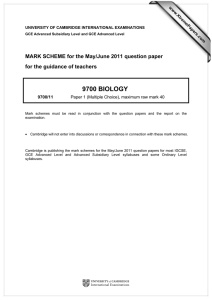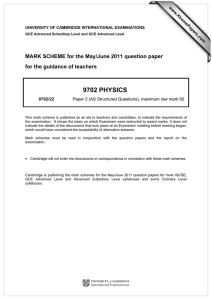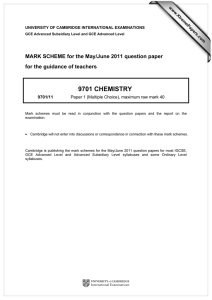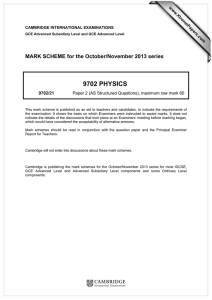9702 PHYSICS MARK SCHEME for the May/June 2012 question paper
advertisement
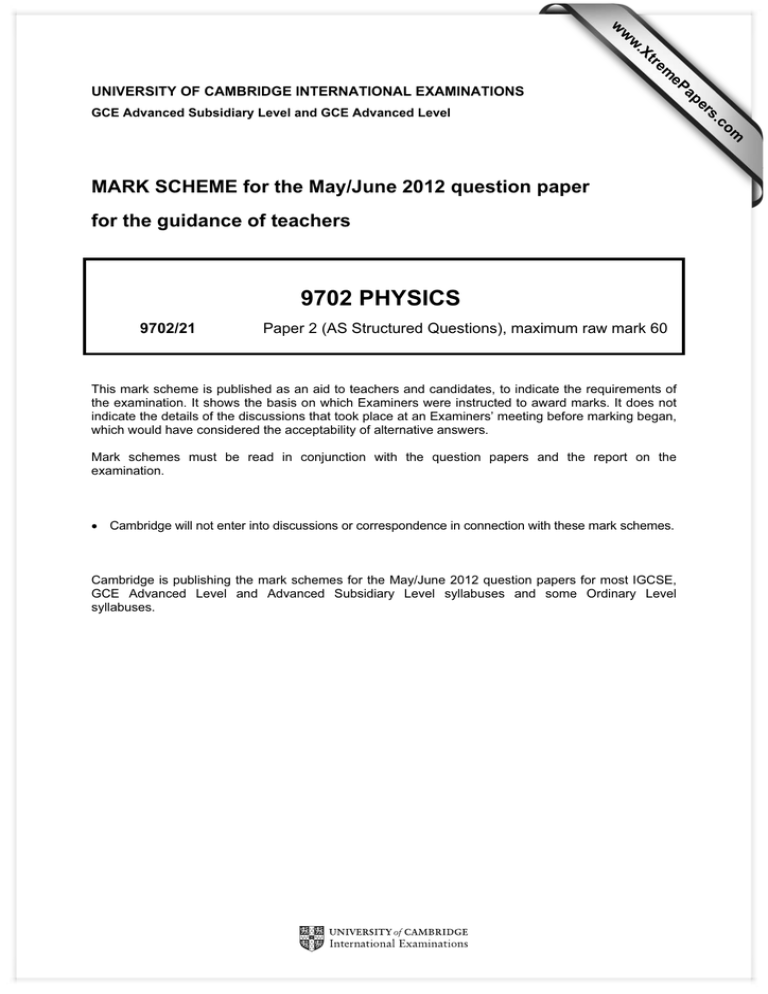
w w ap eP m e tr .X w UNIVERSITY OF CAMBRIDGE INTERNATIONAL EXAMINATIONS for the guidance of teachers 9702 PHYSICS 9702/21 Paper 2 (AS Structured Questions), maximum raw mark 60 This mark scheme is published as an aid to teachers and candidates, to indicate the requirements of the examination. It shows the basis on which Examiners were instructed to award marks. It does not indicate the details of the discussions that took place at an Examiners’ meeting before marking began, which would have considered the acceptability of alternative answers. Mark schemes must be read in conjunction with the question papers and the report on the examination. • Cambridge will not enter into discussions or correspondence in connection with these mark schemes. Cambridge is publishing the mark schemes for the May/June 2012 question papers for most IGCSE, GCE Advanced Level and Advanced Subsidiary Level syllabuses and some Ordinary Level syllabuses. om .c MARK SCHEME for the May/June 2012 question paper s er GCE Advanced Subsidiary Level and GCE Advanced Level Page 2 1 Mark Scheme: Teachers’ version GCE AS/A LEVEL – May/June 2012 Syllabus 9702 (a) (i) V units: m3 (allow metres cubed or cubic metres) (ii) Pressure units: kg m s–2 / m2 (allow use of P = ρgh) Units: kg m–1 s–2 (b) V / t units: m3 s–1 Clear substitution of units for P, r4 and l πP r 4 kg m −1 s −2 m 4 C= = 8V t −1 l m3 s −1 m Units: kg m–1 s–1 (8 or π in final answer –1. Use of dimensions max 2/3) 2 A1 [1] M1 A0 [1] B1 M1 A1 (a) (i) v = u + at C1 = 4.23 + 9.81 × 1.51 M1 = 19.0(4) m s–1 (Allow 2 s.f.) A0 –1 (Use of –g max 1/2. Use of g = 10 max 1/2. Allow use of 9.8. Allow 19 m s ) (ii) either s = ut + ½ at2 (or v2 = u2 + 2as etc.) = 4.23 × 1.51 + 0.5 × 9.81 × (1.51)2 = 17.6 m (or 17.5 m) (Use of –g here wrong physics (0/2)) (b) (i) F = ∆P / ∆t need idea of change in momentum = [0.0465 × (18.6 + 19)] / 12.5 × 10–3 = 140 N (Use of – sign max 2/4. Ignore –ve sign in answer) Direction: upwards C1 A1 [3] [2] [2] C1 C1 A1 B1 [4] C1 A1 [2] B1 [1] (a) Resultant force (and resultant torque) is zero Weight (down) = force from/due to spring (up) B1 B1 [2] (b) (i) 0.2, 0.6, 1.0 s (one of these) A1 [1] (ii) 0, 0.8 s (one of these) A1 [1] (iii) 0.2, 0.6, 1.0 s (one of these) A1 [1] (ii) h = ½ × (18.6)2 / 9.81 = 17.6 m (2 s.f. –1) (Use of 19 m s–1, 0/2 wrong physics) (c) either or 3 Paper 21 kinetic energy of the ball is not conserved on impact speed before impact is not equal to speed after hence inelastic © University of Cambridge International Examinations 2012 Page 3 Mark Scheme: Teachers’ version GCE AS/A LEVEL – May/June 2012 Syllabus 9702 (c) (i) Hooke’s law: extension is proportional to the force (not mass) Linear/straight line graph hence obeys Hooke’s law 4 B1 B1 [2] (ii) Use of the gradient (not just F = kx) K = (0.4 × 9.8) / 15 × 10–2 = 26(.1) N m–1 C1 M1 A0 [2] (iii) either energy = area to left of line or energy = ½ ke2 = ½ × [(0.4 × 9.8) / 15 × 10–2] × (15 × 10–2)2 = 0.294 J (allow 2 s.f.) C1 C1 A1 [3] (a) (i) R = V2 / P or P = IV and V = IR = (220)2 / 2500 = 19.4 Ω (allow 2 s.f.) C1 A1 [2] (ii) R = ρl / A l = [19.4 × 2.0 × 10–7] / 1.1 × 10–6 = 3.53 m (allow 2 s.f.) C1 C1 A1 [3] A1 [1] (b) (i) P = 625, 620 or 630 W (ii) R needs to be reduced Either length ¼ of original length or area 4× greater or diameter 2× greater 5 C1 A1 [2] B1 [1] B1 [1] C1 A1 [2] (ii) R = [0.90 / 1.0] × 4 (= 3.6) V = I R = 0.286 × 3.6 = 1.03 V (If factor of 0.9 not used, then 0/2 marks) C1 A1 [2] (iii) E = 1.03 V A1 [1] (iv) either or B1 [1] M1 A1 [2] B1 [1] (a) (i) sum of e.m.f.’s = sum of p.d.’s around a loop/circuit (ii) energy (b) (i) 2.0 = I × (4.0 + 2.5 + 0.5) I = 0.286 A (allow 2 s.f.) (If total resistance is not 7 Ω, 0/2 marks) 6 Paper 21 no current through cell B p.d. across r is zero (a) (i) coherence: constant phase difference between (two) waves (ii) path difference is either λ or nλ or phase difference is 360° or n × 360° or n2π rad © University of Cambridge International Examinations 2012 Page 4 7 Mark Scheme: Teachers’ version GCE AS/A LEVEL – May/June 2012 Syllabus 9702 Paper 21 (iii) path difference is either λ/2 or (n + ½) λ or phase difference is odd multiple of either 180° or π rad B1 [1] (iv) w = λD / a = [630 × 10–9 × 1.5] / 0.45 × 10–3 = 2.1 × 10–3 m C1 C1 A1 [3] (b) no change to dark fringes no change to separation/fringe width bright fringes are brighter/lighter/more intense B1 B1 B1 [3] (a) (i) 2 protons and 2 neutrons B1 [1] B2 [2] (ii) e.g. positively charged 2e mass 4u constant energy absorbed by thin paper or few cm of air (3 cm → 8 cm) (not low penetration) highly ionizing deflected in electric/magnetic fields (One mark for each property, max 2) (b) mass-energy is conserved difference in mass ‘changed’ into a form of energy energy in the form of kinetic energy of the products / γ-radiation photons / e.m. radiation © University of Cambridge International Examinations 2012 B1 B1 B1 [3]
